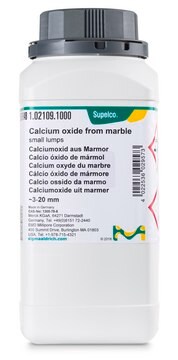634182
Calcium oxide
nanopowder, <160 nm particle size (BET), 98%
Synonym(s):
Lime, Quicklime
About This Item
Recommended Products
Quality Level
Assay
98%
form
nanopowder
particle size
<160 nm (BET)
bp
2850 °C (lit.)
density
3.3 g/mL at 25 °C (lit.)
SMILES string
O=[Ca]
InChI
1S/Ca.O
InChI key
ODINCKMPIJJUCX-UHFFFAOYSA-N
Looking for similar products? Visit Product Comparison Guide
Related Categories
General description
Application
- Use of Calcium Oxide in Sustainable Concrete Production: Investigates the role of calcium oxide in enhancing the anti-carbonation properties of alkali-activated slag concrete, suggesting its utility in sustainable building practices (P Shi et al., 2024).
- Calcium Oxide from Agroindustry Waste for Dental Applications: Evaluates the synthesis of calcium oxide nanoparticles from eggshell waste, focusing on their potential in promoting dental tissue regeneration (J do Amparo Madureira et al., 2024).
- Calcium Oxide in High-Ash Coal Slime Remediation: Discusses the use of calcium oxide in soil amendments derived from high-ash coal slime, enhancing adsorption performance for environmental cleanup (Y Tian et al., 2024).
- Development of Calcium Oxide-Based Activators: Details the use of waste calcium oxide fly ash as an activator in the vulcanization of natural rubber, reducing the need for zinc oxide and enhancing environmental sustainability (W Naebpetch et al., 2024).
Legal Information
Signal Word
Danger
Hazard Statements
Precautionary Statements
Hazard Classifications
Eye Dam. 1 - Skin Irrit. 2 - STOT SE 3
Target Organs
Respiratory system
Storage Class Code
13 - Non Combustible Solids
WGK
WGK 1
Flash Point(F)
does not flash
Flash Point(C)
does not flash
Personal Protective Equipment
Regulatory Listings
Regulatory Listings are mainly provided for chemical products. Only limited information can be provided here for non-chemical products. No entry means none of the components are listed. It is the user’s obligation to ensure the safe and legal use of the product.
ISHL Indicated Name
Substances Subject to be Indicated Names
ISHL Notified Names
Substances Subject to be Notified Names
JAN Code
634182-100G:4548173944784
634182-25G:4548173944791
634182-BULK:
634182-VAR:
Choose from one of the most recent versions:
Already Own This Product?
Find documentation for the products that you have recently purchased in the Document Library.
Customers Also Viewed
Global Trade Item Number
| SKU | GTIN |
|---|---|
| 634182-100G | 4061833607060 |
| 634182-25G | 4061833607077 |
Our team of scientists has experience in all areas of research including Life Science, Material Science, Chemical Synthesis, Chromatography, Analytical and many others.
Contact Technical Service









